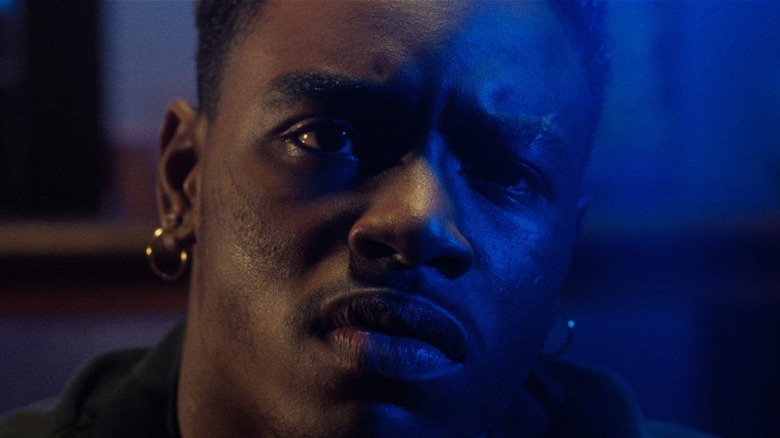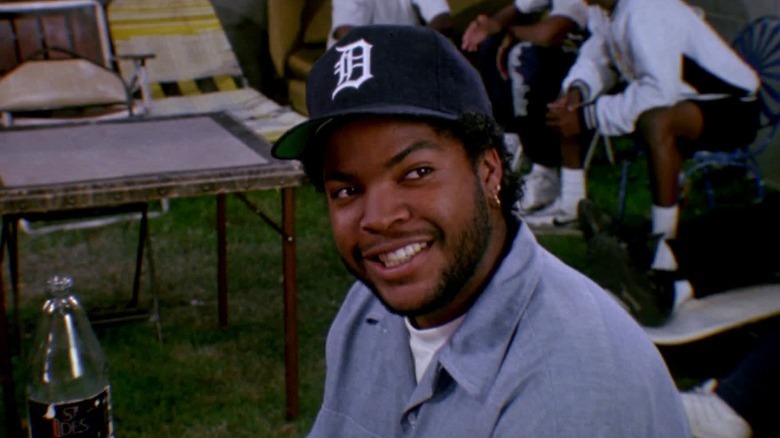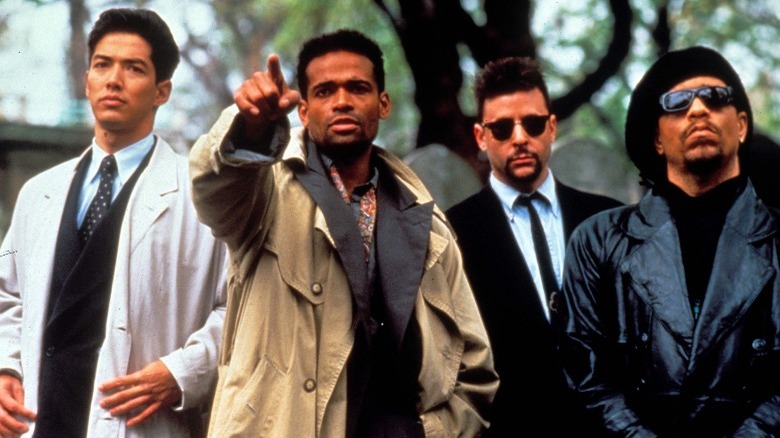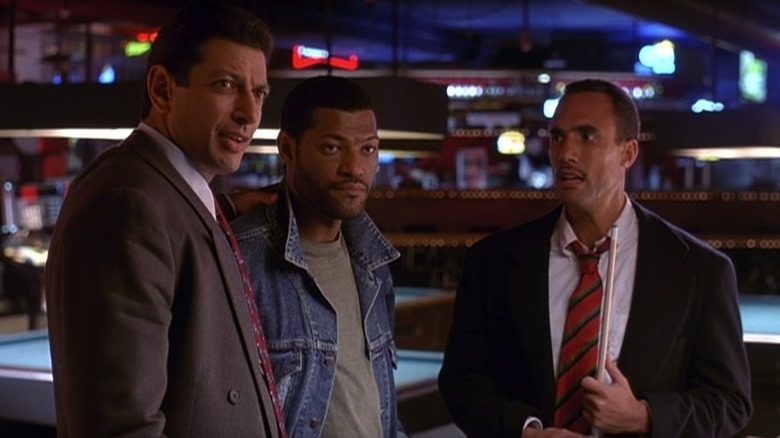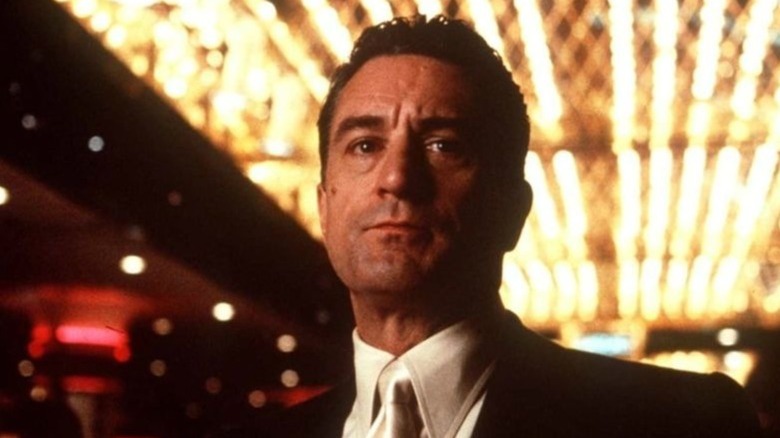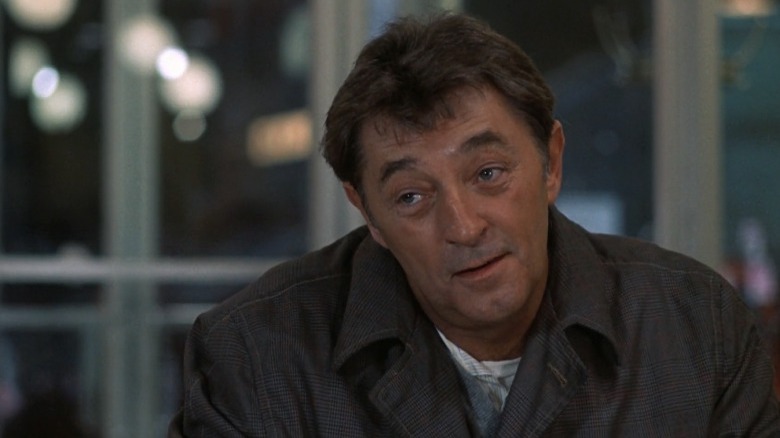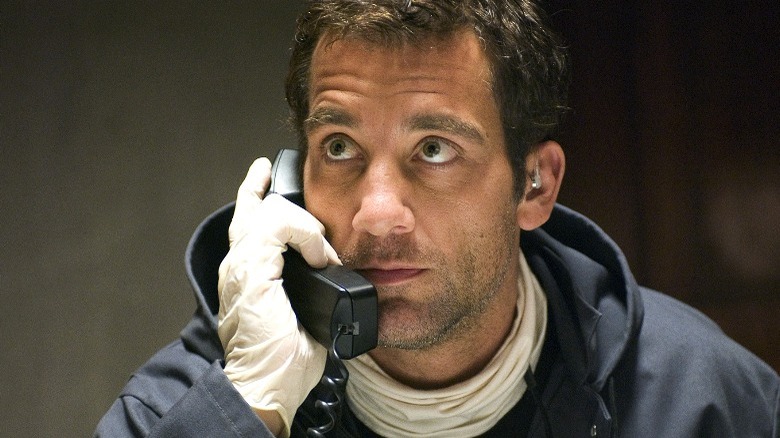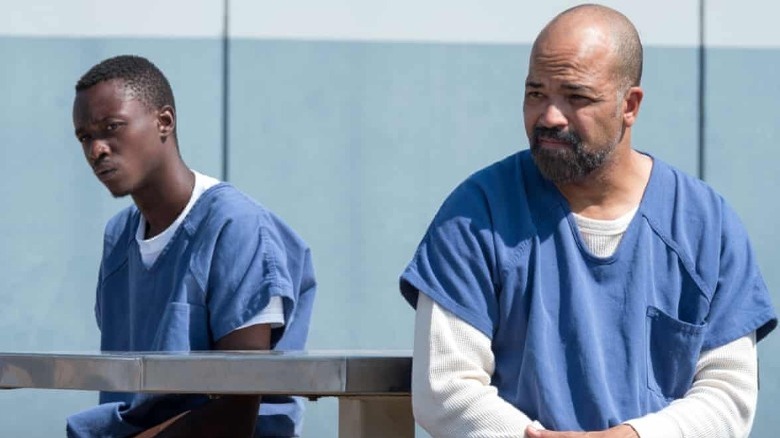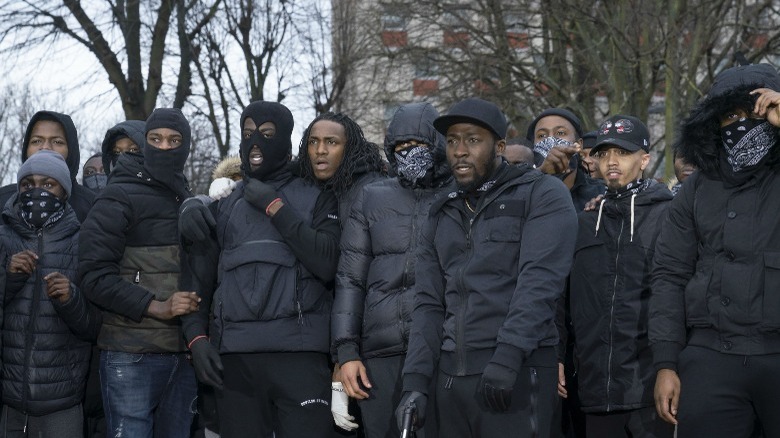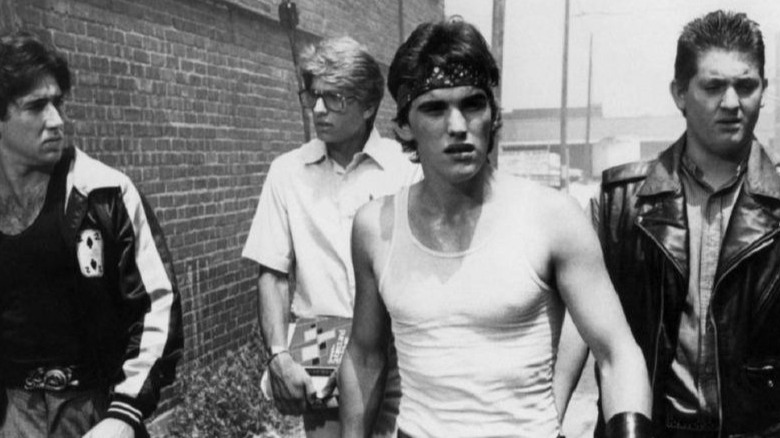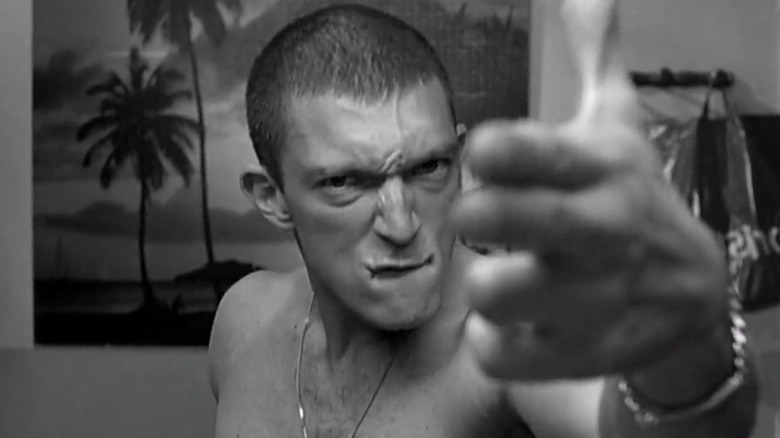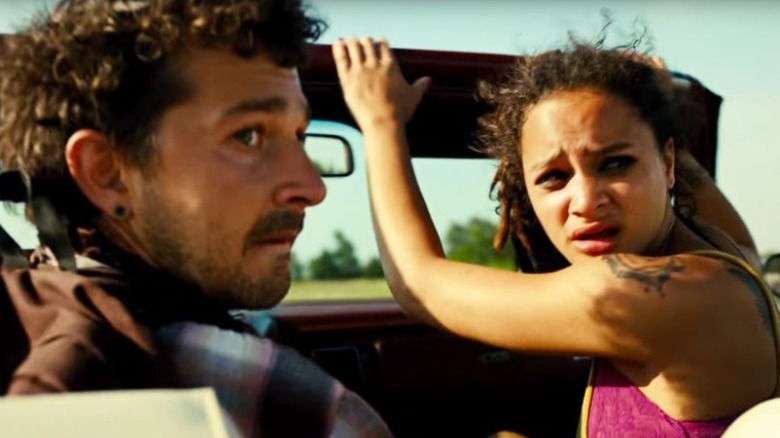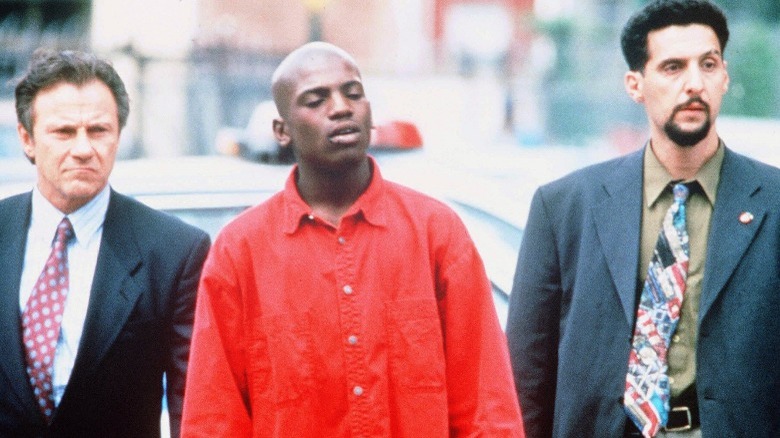Movies Like Menace II Society That Crime Fans Need To See
It's easy to assume that the people making the films you watch are a great deal older than you, but sometimes a tremendous young talent emerges to break the mold. In the case of "Menace II Society," it was actually multiple young talents. Twin brothers Albert and Allen Hughes directed their debut film when they were barely 20 years old, but they handled the film with the expertise of a duo far older.
"Menace II Society" is an unflinching look at living in Los Angeles in the early 1990s. Caine (Tyrin Turner) grows up in the monstrous shadow of his vicious, dread-inducing drug dealer father (an unexpected performance from Samuel L. Jackson). Caine's support system comes largely from his best friend, O-Dog (Larenz Tate), who has a tendency for crime, as he opens fire on some shopkeepers in the film's shocking opening scene. The film weds its realism with a remarkably advanced, bold aesthetic, making "Menace II Society" a brilliant cautionary tale and a devastating ode to the horrors of the world of crime.
With a brand spanking new Ultra HD release of "Menace II Society" now out, it's a perfect time for the harrowing, essential film to be revisited. There are plenty of great films that the Hughes Brothers' film helped inspire, as well as films that clearly inspired their seminal work. In honor of this, let's take a look at movies like "Menace II Society" that crime fans need to see.
Boyz n the Hood
John Singleton had an impressive career before his tragic death at age 51 in 2019. Singleton directed films like "Poetic Justice," "Four Brothers," and "2 Fast 2 Furious," but his biggest success is arguably his debut film, "Boyz n the Hood." Singleton was just 23 when the film was released in 1991, and the film was a huge deal, earning him an Oscar nomination for Best Director and Best Screenplay. Singleton's director nomination was the first ever for a Black director, and also the youngest director to ever be nominated. It's easy to see why "Boyz n the Hood" received such accolades, as Singleton's film is a searing coming-of-age drama about the dangers of growing up in a Los Angeles ghetto.
Cuba Gooding Jr. put himself on the map in his breakthrough performance as Tre Styles, who is sent to live with his dad, Furious Styles (Laurence Fishburne) in order to learn valuable lessons about maturity and authority. It's difficult to undersell the importance of "Boyz n the Hood." Getting the Academy's attention made studios take notice, and SIngleton's film essentially gave birth to the "hood film" genre, including "Menace II Society." The film also included a number of great performances, including from Angela Bassett and Nia Long in their first significant roles.
New Jack City
Director Mario Van Peebles had big shoes to fill — his father, Melvin Van Peebles, was a genuine game-changer in American cinema. Melvin's "'Sweet Sweetback's Baadasssss Song' style and politics continue to compellingly challenge assumptions about the idea of Black film and American film history," according to Criterion's Michael B. Gillespie. Thankfully, Mario delivered on the heavy burden of having a gifted filmmaker for a dad, as his film "New Jack City," which he also stars in, is an excellent choice for fans of crime movies.
"New Jack City" stars an up-and-coming Wesley Snipes as Nino Brown, a drug lord on the rise in New York City and taking full advantage of the crack cocaine epidemic of the 1980s and '90s. His nemesis is detective Scotty Appleton (Ice-T), who will do whatever it takes to topple Brown's criminal empire. Brown doesn't even know that Appleton is his nemesis, as the detective has gone undercover to put an end to Brown's reign. The film performed well at the box office, earning an impressive $47 million on a modest $8 million budget, once again proving the financial viability of films with predominantly Black casts. Roger Ebert gave the film a glowing review, saying, "I've seen a lot of movies where the lifestyle of the drug lord looks seductive...but this isn't one of them. It's a character study of a bad man running an evil business, and by the end even his mistress is telling the cops she'll testify against him."
Deep Cover
In "Deep Cover," Russell Stevens (Laurence Fishburne) is an excellent police officer who makes the ultimate sacrifice by going undercover to infiltrate and eventually dismantle a vicious Latin American drug ring dominating Los Angeles. His alias is "John Hull," and he becomes the partner of a cocaine trafficker with big dreams, played by Jeff Goldblum. Despite being a great cop, Stevens finds his task increasingly difficult, and the deeper into his alias he goes, the more the ideas of right and wrong start to blur. Directed by longtime actor Bill Duke, "Deep Cover" is inspired by film noir, but has a distinct, neon-drenched style that's completely unique. The film also has considerable significance from a musical perspective: it features Dr. Dre's first solo single, a song that brought Snoop Dogg to a wider audience.
The film has a great deal of critical acclaim, with critic Jonathan Rosenbaum observing the film as a "powerhouse thriller full of surprises, original touches, and rare political lucidity, including an impressive performance by Jeff Goldblum." Indeed, it is really exciting to watch the typically lovable, charming Goldblum play against type as such a menacing character. "Deep Cover" also features a brilliant powerhouse display from Fishburne.
Casino
Martin Scorsese's sprawling, epic "Casino" takes a look at crime in the bustling city of Las Vegas, with a close look at the world of gambling and casino management. A low-level mobster, gambling expert Sam "Ace" Rothstein (Robert De Niro) is offered a major opportunity when he's tapped by his bosses to run operations at the Tangiers Casino in Vegas. He regularly butts heads with his friend Nicky Santoro (Joe Pesci), who constantly messes with the skim — the illegal pre-tax diversion of casino proceeds that drives Mafia profits. To make things even more complicated, Ace falls madly in love with Ginger McKenna (Sharon Stone), a hustler who has no real romantic interest in him. Despite her indifference, he's convinced that marriage and offering her protection is the key to happiness.
"Casino" is not one for those with sensitive ears — Scorsese's film contains a whopping 398 instances of the word "f—." The film's heavy use of narration is full of twists and turns. "Casino" operates under the shimmering glitz and glamour of Lost Wages, but just like "Menace II Society," Scorsese's film is a clear indictment that crime doesn't pay.
The Friends of Eddie Coyle
Robert Mitchum was a true Hollywood icon and the very essence of cool personified. Legendary roles in films like "Night of the Hunter," "Cape Fear," and "Out of the Past" cemented his image as the bad boy of Hollywood — a status that was more than confirmed by his personal life. Though Mitchum is best known for his popular roles in the Classical Hollywood period, he actually worked consistently in movies and television until his death in 1997.
One of his later roles, playing Eddie Coyle in Peter Yates' "The Friends of Eddie Coyle," is one of Mitchum's finest performances. The film's title is deeply ironic, as Coyle doesn't have a friend in the world. He is no stranger to difficulties with the law, and his life as a career criminal leads him with something nasty hanging over his head. Coyle is facing a bootlegging charge for a job he took in New Hampshire, and he believes he can't handle hard time. He's done it before, you see, and it's left him penniless and opportunity-less. He's faced with a brutal decision: snitch on his colleagues for his freedom, or stay honest and find himself behind bars.
Yates' film is a masterwork of tension, and Mitchum is brilliant in the lead role. For fans of the way "Menace II Society" deals with the life of crime, you'll find plenty to enjoy in "The Friends of Eddie Coyle." While the film features some wonderfully executed heists, it's far more about the way crime wears you down over time, and how nobody wins in the end.
Inside Man
It's nearly impossible to predict what Spike Lee is going to do next. Lee has tackled just about every genre under the sun, from musicals ("School Daze") to war epics ("The Miracle of St. Anna") to biopics ("Malcolm X"). In 2006, Lee tried his hand at a heist thriller, and, surprising nobody, smashed it out of the park. "Inside Man" features a vastly complicated bank robbery led by Dalton Russell (Clive Owen). Detective Keith Frazier (Denzel Washington) is brought in to negotiate with Russell, as there are dozens of hostages involved.
What feels like a fairly straightforward thriller quickly turns into something far more complex. When Madeleine White (Jodie Foster), a power broker hired to act as a "fixer" by the bank's founder, Arthur Case (Christopher Plummer), things take an unexpected turn — again, and again, and again. It's pretty much impossible to know what's going to happen at any given point watching "Inside Man," which makes its 129-minute runtime fly by. The wallop of the final big twist is oh-so-satisfying.
All Day and a Night
Life hasn't been easy for the protagonist of "All Day and a Night," Jahkor Lincoln (Ashton Sanders). His father, James Lincoln (Jeffrey Wright) is in prison, and Jahkor is determined to not end up like his father. Things are going well for Jahkor, but with the news that his girlfriend is pregnant, increasing concerns that he won't have enough money to take care of his new family cause him to take the wrong path. He turns to petty theft and assaults and ends up offering his talents to the gangster Big Stunna (Yahya Abdul-Mateen II). Despite Jahkor's best efforts to be a good example for his son, his difficult surroundings and upbringing push him to the brink.
As a result of his crimes, he ends up with a life sentence for murder and ends up in prison. Even worse, he ends up face-to-face with his father, which causes him to reflect back on the days before his arrest in order to find some sort of hope to carry on. Written and directed by "Black Panther" co-writer Joe Robert Cole, "All Day and a Night" is a thoughtful meditation on the extraordinary difficulties people face growing up on the "wrong side of the streets." The film features brilliant performances from Sanders and Wright, and you can feel the influence of "Menace II Society" throughout.
Blue Story
Marco (Micheal Ward) and Timmy (Stephen Odubola) are best friends who grew up in different areas of South London. Due to the increasing violence in the area, both Marco and Timmy are swept up in gang activity, but because of where they live, they find themselves in opposing gangs. The stylish and authentic "Blue Story" creatively uses rap music to provide narration throughout.
Based on writer-director Rapman's own experiences growing up in London, "Blue Story" received some unfortunate controversy in the United Kingdom after youngsters armed with machetes filled a cinema screening of the film. As a result, a number of cinema chains in the UK decided to pull the film entirely, citing concerns that the film could incite violence, but from watching "Blue Story," it's extremely clear that the film is a stark reminder of what a terrible epidemic gang violence can be. The heartbreaking story is a timeless and effective story and a stark reminder that gang violence isn't only a problem in America.
Rumble Fish
Francis Ford Coppola's dreamlike ode to troubled youth, "Rumble Fish" is a fantastic choice for fans of "Menace II Society." The film is based on the novel of the same name written by S.E. Hinton, who co-wrote the film with Coppola (she also penned "The Outsiders"). "Rumble Fish" focuses on the relationship between two brothers: the Motorcycle Boy (Mickey Rourke), a beloved former gang leader who wants nothing more than to revert to a peaceful life, and his younger brother Rusty James (Matt Dillon), a troublemaker who wants to be every bit as revered as his brother.
Emblematic of both the French New Wave and German Expressionism, "Rumble Fish" is breathtakingly beautiful, and its nod to the avant-garde gives it an exciting and unique visual style. Under the beauty lies an equally compelling story of kids trying to break free from societal expectations and live life the way they want. As Richard Brody of the New Yorker says, "Rumble Fish" is "a myth-infused coming-of-age story that's directed with a grandly imaginative visual repertoire to match."
La Haine
Directed by Mathieu Kassovitz, "La Haine" positively bursts through the screen with angst and rage. While many films have tried to capture the endless frustrations of Gen X in the 1990s, few are more potent than this French film. Shot in evocative black and white, the film looks at the lives of Vinz (Vincent Cassel), Saïd (Saïd Taghmaoui), and Hubert (Hubert Koundé) — a Jew, an Arab, and an African — as they roam the streets of their dull Parisian suburb. The trio represents France's immigrant communities, and the film provides a powerful look at youth aimlessness from a French perspective.
Kassovitz's film has received huge critical acclaim, and currently holds a 100% approval rating on Rotten Tomatoes. As observed in his five-star review for The Guardian, Peter Bradshaw notes that the film is "an unmissable response to an unending emergency." Just like "Menace II Society," "La Haine" is a searing story about what it is like to live in a world that doesn't seem to want anything to do with you.
American Honey
In "American Honey," Star (Sasha Lane) hates living at home. She cares for two younger siblings, and they all live with their disgusting, sexually abusive father. One day when she tries to hitchhike home, she sees a group of joyful-looking youngsters and follows them. She ends up joining them, as she's offered a job by Jake (Shia LaBeouf) as part of their magazine subscription-selling crew. Star soon finds a home with this group of teenagers and finds herself sucked into the group's lifestyle of boozy partying, casual law-breaking, and passionate love affairs.
Andrea Arnold's "American Honey" is something of an epic (it's nearly three hours long, but it feels a lot shorter). It's brilliantly paced, and the gang's tendency to get themselves into trouble has a strangely hypnotic effect. According to film critic Jess Kibler of Bitch Media, Arnold's film is "completely gorgeous and remarkable...'American Honey' manages to depict the desperation of being a poor young person in a forgotten corner of America without condescending to or worshipping its destitute characters." This depiction of a forgotten corner of America links it to "Menace II Society," as both films center around forgotten and neglected youth.
Clockers
Spike Lee always directs with his heart, as his films are full of love and passion. His 1995 crime film "Clockers" takes us to the streets of Brooklyn. Nineteen-year-old Strike (Mekhi Phifer in his film debut) is a small-time dealer who works for the menacing Rodney Little (Delroy Lindo). Lindo wants Strike to do something for him: kill a former employee of Little's that stole from him. When that man winds up dead, Strike becomes the prime suspect of an NYPD homicide detective (Harvey Keitel), who tries to force a confession from a man who didn't kill anyone.
Lee's film is a vibrant, yet grim portrait of a crime-ridden Brooklyn. Its characters are well-developed and never feel like cheap caricatures, which are all too easy to rely on in films about crime. Janet Maslin, the film critic for the New York Times, observes that "Clockers" is "a story told with mournful, epic vision that rises high above its grim setting." The film made a well-deserved star out of Mekhi Phifer, and Lee's film is a prescient reminder of the dangers of crime. Its tragic ending will stick with you.
